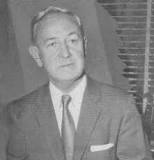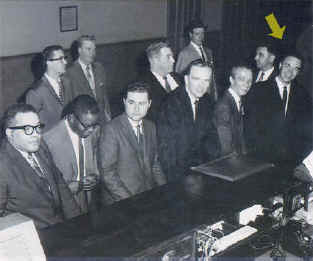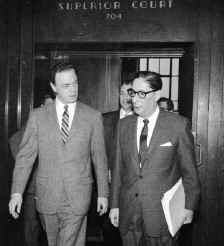
Frank Hogan
New York Commercial Bribery Grand Jury Hearings

Frank Hogan
While Payola wasn't illegal federally, several states had on their books
commercial bribery laws that appeared to make payola a violation of the law. Independents
that had been paid over $250,00 to 207 jockeys in 42 cities were singled out. State
prosecutors began suits with the most vigorous activity occurring in was in New York, the
home of ASCAP.
![]()
The probe conducted by New York District Attorney Frank Hogan's office was simply an offshoot of his months of looking into possible fraudulent television commercials.
Section 439 of the New York State Penal Law of 1909 deals with the corrupt influencing of agents, employees or servants. Under the statute, any individual who gives, offers, or promises any gift or gratuity whatever, " to an employee, "without the knowledge or consent of the employer, "with intent to influence" the employee's action is guilty of a misdemeanor and subject to a fine not to exceed $500 or to an imprisonment of not more than one year, or both.. An employee who :without the knowledge or consent" of his employer "requests or accepts a gift or gratuity with the understanding that he should act in any particular manner in relations to his employer's business" is guilty of the same misdemeanor
In November 1959, the New York District Attorney had spent several months looking into fraudulent television commercials began to look into the music business.
New York's District Attorney's office announced grand jury hearings on misdemeanor criminal bribery charges against disk jockeys resulting in pressure on the employers, whose operating licenses were suddenly in peril. ABC-TV and Radio were among the first to act, asking employees to sign affidavit denying any involvement in payola.
Manhattan district attorney Frank Hogan began an investigation into the violation of the Commercial Bribery Statute by subpoenaing the financial records of eleven New York record companies and several disc jockeys. Allegedly under pressure by ASCAP subpoenaed the books of all New York record companies. Several major discrepancies and the out cry soon reached
Singled out were the independents that had paid over $250,00 to 207 jockeys in 42 cities. Among those targets was King Records. Owner Sid Nathan readily admitted that he paid more than a dozen DJs, some in New York, as much as $100 a month to play the company's records. Payments had been made by check because Nathan didn't see payola as illegal. Nathan testified "It is a dirty rotten mess and it has been getting worse and worse in the last five years. It's getting so you can't get your records played unless you pay."

Front row left to right
Jack Walker, WLIB disc jockey; Tommy (Dr. Jive) Smalls; WWRL disc jockey; WWRL disc
jockey; Joseph Saccone, WMGM record librarian; Peter Tripp, WMGM disc jockey; Mel Leeds,
WINS program director; and Alan Freed.
On May 10, 1960 Assistant District Attorney Joseph Stone's grand jury handed down indictments for misdemeanor commercial bribery charge.
In 1960 Hogan indicted five disc jockeys, two station librarians and one program director on misdemeanor violations of the commercial bribery statue. They were charged with receiving payola from twenty-three record manufacturers and distributors totaling $116, 850 over the last two years. Among the companies were Alpha Distributing, Superior Record Sales, Roulette Records and Costa distributing. Hogan only charged one of the companies claiming it was common practice to prosecute only one party in alleged bribery and give immunity to others for their testimony. He won several convictions and many of the disc jockeys were fired as they awaited trial.
On May 19 Alan Freed and seven others were arrested and booked at a Manhattan police station and charged with receiving a total of $116,850 in payola. Freed who refused to testify was charged with 29 counts. Mel Leeds with forty, disk jockey Tommy "Dr. Jive" Smalls of WWRL forty-eight counts, Hal Jackson thirty-nine counts, Jack Walker of WLIB thirty three counts, Peter Tripp of WMGM twenty nine counts and two record librarians, WIN's Ron Granger and WMGM's Joseph Saccone.
Tommy Smalls was charged with taking $13,385; Hal Jackson $9,850; Jack Walker $7,420; Joseph Saccone $2,000; Ronald Granger $7,550; and Mel Leeds $9,675; and Peter Tripp 36,050. upon being charged Tripp was immediately fired.
The first to be tried was Peter Tripp, who was then working at KYA in San Francisco. During the trial Tripp's attorneys conceded that he accepted the money but maintained this was not commercial bribery because he wasn't a station employee but an independent contractor and therefore was allowed to make such deals. Harry Apostoleris of Alpha Distributing testified that he had paid Tripp $10,400 until the payola stories started appearing in the newspapers. Apostoleris told of asking Tripp for air time for records of the various labels he represented. Tripp said he could do this and offered to play four on each show.. Apostoleris offered $500 with a agreed to at $750. At Tripp's request the checks were made out to his wife. At the same time Laurie Records, one of the labels represented by Alpha, paid Tripp $8,000. Neither Alpha nor Laurie knew each was paying Tripp.Coed Records vice president Marvin Cane testified that his company paid tripp 1/2 cent for each copy sold. Trip of "Sixteen Candles" sold. Tripp played it repeatedly on his program.
Tripp testified that he was entitled to make such deals under his contract as an independent contractor. He also claimed that he was given the money was for his advice as to what records would be successful, what records to buy and what companies should seek in new sounds and artists.
"I never took a dime for playing records"
Peter Tripp
Asked why the checks for his "advice" were made out to his wife, Tripp explained that it was several people were suing him and he didn't want anymore income in his name.. He also noted that this money was reported on his income tax returns.
On May 15, 1961, Tripp was found guilty on 35 counts of commercial bribery. - accepting monies from companies without his employer's knowledge to influence his official acts - by an unanimous finding by three three judge panel.. Assistant District Attorney Joseph Stone asked for a jail sentence, arguing that Tripp had "boldly and flagrantly violated the law and should suffer the consequences of his acts." His attorney Benjamin Shedler asked for leniency for the "penniless' Tripp.
"He has suffered more than anyone should for a crime of this sort.
He lost his job, he was out of work or seven months, he is hopelessly in debt, his house
foreclosed, his reputation destroyed and his future washed out."
Ben Shedler
On October 16, 1961 Tripp received a $500 fine and a six-month suspended sentence.
Charges against Harold Jackson were dismissed in court after he produced evidence that he was an independent contractor and not an employee of WLIB.

Alan Freed with his attorney leaving Superior Court
In December 1962 Alan Freed apeared in New York Superior Court where he plead guilty to accepting $700 from Superior Records and $200 from Cosnat Distributing. He was give a $300 fine and a six-month suspended sentence. In March 1964 Freed was indicted on charges od evading income taxes from 1957-59. The IRS charged thast Freed in those years had under reported his income by $56,652, thus escaping $37,929 of Tax. Freed would die before the case came to trial.
FCC and FTC moved against the companies. FCC commissioner Robert Lee declared the practice were "sneaky commercials" that violated the requirement that paid sponsors be identified. FCC directed all 5,236 radio and television stations submit sworn statements indicating whether any employees had taken cash or gifts in exchange for on the air plugs during the last year. Licensees were required to set forth actions taken to prevent payola from occurring in the future
In a twenty page brief to the FCC, ASCAP president Stanley Adams said payola "goes much deeper than a few isolated cases." That at least 146 of 277 top 50 hits of 1959 benefited from payola to combat advocated prohibiting radio stations from accepting any remuneration in exchange for playing a musical composition and order broadcasters to divest in BMI. In March 1960 FCC ruled that many stations had failed to comply with Section 317 of the communications act of 1934, which required stations to mention on air to mention any material that had been furnished to them free. FCC put stations on notice that they could no longer escape punishment by pleading reliance on "accepted industry practice."
The FTC assigned forty staff members to the payola investigation. By August 1960, the FTC had charged 106 record manufactures and distributors with deceptive acts or practices designed to "suppress competition\n and to divert trade unfairly from their competitors." FTC chairman Earl Kinter estimated that an "exceedingly high percentage" of 256 distributors 481 record companies used payola as a :standard operating procedure." most readily admitted they had broken the law "sure we paid disc jockeys. we met competition. every company was involved in it in one way or another. we merely fought the battle to sell records and that was to pay some of the bigger disc jockeys not only was the number of plays a day no guarantee of public acceptance "as there is no objective standard to determine the superiority of one record over another, there is no deception."
Virtually all the defendants signed consent degrees. By 1961, Kinter believed that payola had been "pretty well stamped out." John Walker, assistant to the Director of Litigation at the FTC agreed. The FTC had no jurisdiction over disc jockeys but, its investigators believed that at least 255 disk jockeys or other radio station employees in fifty-six cities in twenty-six states had taken payola. The the files for all the disc jockeys turned over to the FCC, the IRS and the House Subcommittee.
Though denouncing the ruling the NAB agreed that payola was wrong. However, it insisted that the receiving of free records by a broadcasting station did not effect a station's objectivity in deciding what it would play.
They said if stations had to buy all their records, the impact would fall disproportionately on independent broadcasters and record companies. only a few stations could afford to spend $10,000 to $20,00 to stock new releases many smaller stations would take fewer chances, sticking with the heavily promoted records of the major labels. It would be the listening public that would suffer since the variety of music available would be reduced